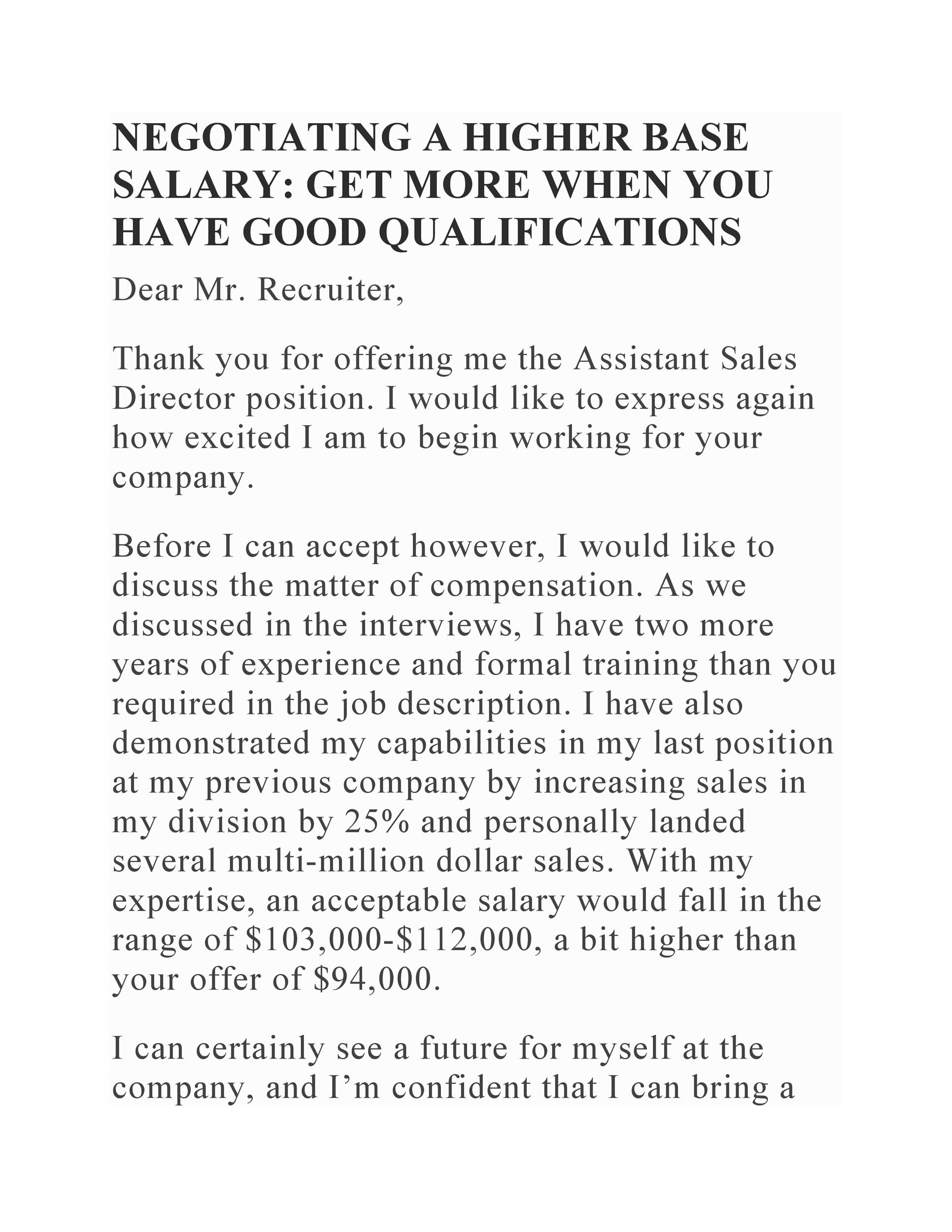Job Offer Negotiation: Strategies For A 'Best And Final' Offer

Table of Contents
Researching Your Worth Before Negotiation
Before you even think about counter-offers, you need a solid understanding of your market value. This isn't about arrogance; it's about informed negotiation.
Understanding Market Value
Knowing your worth involves thorough research. Utilize online resources like Glassdoor, Salary.com, Payscale, and LinkedIn Salary to research salary ranges for similar roles in your geographic location.
- Consider experience: Filter your searches by years of experience to find data relevant to your career stage.
- Factor in skills: Include keywords reflecting your specific skills and expertise to pinpoint relevant salary data.
- Account for location: Salary varies significantly by location due to cost of living differences. Specify your city or region in your searches.
- Company size matters: Larger companies often offer higher compensation packages than smaller startups. Factor this into your research.
Refine your searches using Boolean operators like AND, OR, and NOT. For example, searching for "Software Engineer AND Python AND San Francisco" yields more precise results than a broader search.
Quantifying Your Achievements
Beyond salary data, showcase your accomplishments. Quantify your contributions with concrete examples and data whenever possible.
- Increased Sales: Instead of saying "improved sales," say "increased sales by 15% in Q3 2023."
- Cost Savings: Quantify cost reductions: "implemented a new system that reduced operational costs by $10,000 annually."
- Project Successes: Highlight project successes with quantifiable metrics: "successfully launched a new product resulting in a 20% increase in user engagement."
If an achievement is qualitative, try to translate it into quantifiable terms. For example, "improved team morale" could be supported by "reduced employee turnover by 10%."
Crafting Your Counter-Offer Strategy
Once you've researched your worth, it's time to develop a counter-offer strategy.
Identifying Your Priorities
Determine your non-negotiables – the aspects you absolutely will not compromise on – and areas where you’re willing to be flexible.
- Non-Negotiables: Base salary, health insurance, remote work options (if essential).
- Negotiables: Vacation time, bonus structure, professional development budget.
Prioritize your needs. What's most important to you? Rank your priorities to guide your negotiation strategy.
Formulating a Confident Counter-Offer
Present your counter-offer professionally and confidently. Avoid aggressive or demanding language.
- Focus on value: Frame your request in terms of the value you bring to the company. For example, "Based on my research and my proven track record of increasing sales, I believe a salary of $X aligns with my market value and the contributions I'll make to your team."
- Justify your request: Clearly explain the rationale behind your desired compensation, referencing your research and accomplishments.
- Use specific numbers: Avoid vague terms like "competitive salary." Provide precise figures.
Navigating the Negotiation Process
Effective communication is key during salary negotiations.
Communication Skills
Active listening, clear communication, and professional etiquette are essential.
- Ask clarifying questions: Ensure you understand the offer's details completely.
- Summarize agreements: Repeat key points to confirm mutual understanding.
- Maintain a positive tone: Negotiations should be collaborative, not adversarial.
Handling Objections
Prepare for potential objections and craft responses that emphasize compromise and win-win scenarios.
- Objection: "That salary is above our budget." Response: "I understand. Could we explore alternative ways to reach a mutually agreeable compensation package? Perhaps a slightly lower base salary with a performance-based bonus?"
- Objection: "We can't offer that much vacation time." Response: "I understand. Would you consider offering additional paid time off in lieu of some other benefit?"
Securing the 'Best and Final' Offer
The final stage involves making informed decisions and finalizing the agreement.
Knowing When to Walk Away
Recognize your limits. Don't accept an offer that significantly undervalues your skills and experience.
- Consider your career goals: Does the offer align with your long-term career aspirations?
- Assess your financial needs: Does the compensation meet your financial requirements?
- Evaluate work-life balance: Does the job offer a suitable work-life balance?
Finalizing the Agreement
Carefully review the contract before accepting.
- Verify salary and benefits: Ensure all details are accurate and match the agreed-upon terms.
- Clarify start date and probationary period: Confirm all terms related to your employment.
- Get everything in writing: Have a clear written record of all agreed-upon terms and conditions.
Conclusion
Mastering job offer negotiation involves thorough research, confident communication, and a clear understanding of your priorities. By following the strategies outlined in this article, you can effectively negotiate your next job offer and secure the best possible outcome. Download our free checklist to guide you through each step of the process and confidently negotiate your job offer effectively to secure your best and final job offer. Remember, you deserve fair compensation for your skills and experience!

Featured Posts
-
 Billie Jean King Cup Kazakhstans Unexpected Victory Against Australia
May 23, 2025
Billie Jean King Cup Kazakhstans Unexpected Victory Against Australia
May 23, 2025 -
 Dc Legends Of Tomorrow A Comprehensive Guide
May 23, 2025
Dc Legends Of Tomorrow A Comprehensive Guide
May 23, 2025 -
 Freddie Flintoff Reveals Face After Top Gear Crash
May 23, 2025
Freddie Flintoff Reveals Face After Top Gear Crash
May 23, 2025 -
 Odd Burgers Vegan Meals Hit 7 Eleven Stores Across Canada
May 23, 2025
Odd Burgers Vegan Meals Hit 7 Eleven Stores Across Canada
May 23, 2025 -
 Sunday April 19th Nyt Mini Crossword Complete Solution Guide
May 23, 2025
Sunday April 19th Nyt Mini Crossword Complete Solution Guide
May 23, 2025
